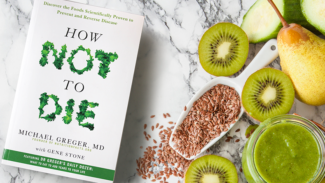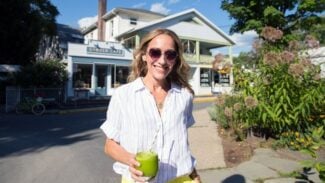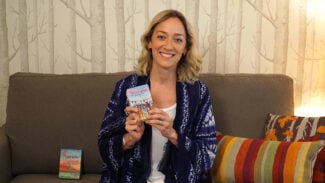Hiya Gorgeous,
Plants are powerful. I’ve experienced this in my own life, and I’ve seen plant foods transform the health of countless readers just like you. They were the light in a very dark tunnel when I was diagnosed and over a decade later, they continue to fill my days with energy, joy and tastiness.
Today, I have a special treat for you—an exclusive interview with Dr. Michael Greger, New York Times best-selling author, internationally-recognized lecturer, physician specializing in clinical nutrition (of the plant-based kind!) and founder of NutritionFacts.org.
I’ve been a long-time fan of his work, and today I finally get to pick his brain about some of my favorite topics, from what plant foods are the most powerful inflammation-fighters to his top longevity-boosting smoothie ingredients.
In Dr. Greger’s best-selling book, How Not to Die, he examines the top fifteen causes of death in the United States and explains how nutritional and lifestyle interventions have the ability to surpass pharmaceutical and surgical approaches when treating some major health hiccups, like heart disease, diabetes and various cancers. He also gives practical advice for adopting a healthy diet and lifestyle and uses cutting edge nutritional science to prove that your genes are not your destiny.
We all know this prevention-packed approach is music to my ears, so let’s get an inside look at some of Dr. Greger’s top health tips for living a longer, healthier life…
Kris: I really enjoyed reading about how your grandmother inspired you to become a doctor. My grandma has been a huge inspiration to me as well. She inspired me to learn how to cook, but cancer inspired me to turn my kitchen into my pharmacy. Can you tell our readers about your grandmother’s empowering health story?
Dr. Greger: I think the spark for many kids to want to become a doctor when they grow-up is watching a grandparent get sick, or even die. But for me, it was my grandma getting better. At 65 years old, she had already had a couple of open heart surgeries, and she was told there was nothing more her doctors could do. She was wheelchair-bound with crushing chest pain when she heard about Nathan Pritikin’s plant-based program. If anyone needed heart disease reversal, it was her.
They wheeled my grandmother into the Pritikin facility, and after she completed the program, she no longer needed her wheelchair and walked out on her own. I’ll never forget that. And for a kid, that’s all that matters—you get to play with grandma again. Thanks to a healthy diet, she was able to enjoy another 28 years on this earth with her six grandkids, including me!
Kris: In your new book, How Not To Die, you cover the top 15 causes of mortality in the United States. You’ve seen the power diet and lifestyle have to reverse disease in your own family. But in a broader sense, how much do you think these common diseases are caused by genetics versus our health habits?
Dr. Greger: The best available evidence suggests that up to 80% of chronic diseases are attributable to lifestyle habits (including diet). So, thank you for helping to spread the word about dietary sanity—it’s so important! What I find inspiring about these numbers is that even if you may have been dealt a certain set of genes, you can reshuffle the deck with your healthy habits. Our genes are not our destiny.
Kris: How did you narrow down the winners on your Daily Dozen list when there are so many healthy foods and lifestyle choices out there?
Dr. Greger: I just followed the science! The Daily Dozen is a list of plant-based foods and lifestyle practices that you should be aiming to meet every day to increase your wellness and add years to your life (grab the free Daily Dozen app for iPhone and Android!). All of the winners are evidence-based recommendations; I compiled the strongest medical studies into a list. If anyone wants to read the original study, I cite all of my sources (thousands of them actually!) on NutritionFacts.org and in my book. The Daily Dozen list includes: beans, berries, other fruits, cruciferous veggies, greens, other vegetables, flaxseeds, nuts, whole grains, spices, exercise and hydration.
Kris: Most of your Daily Dozen list covers broad categories of food and exercise, but flaxseed gets its own spot. Why is it so powerful and how do you advise people to fit it into their diets more regularly?
Dr. Greger: Randomized, double-blind, placebo-controlled trials have shown that the consumption of a few spoonfuls of ground flaxseeds a day can bring down blood pressure 2 to 3 times better than our leading blood pressure medications. And unlike most medications, they also only have good side effects, reducing the risk of breast and prostate cancer, controlling cholesterol, triglycerides and blood sugars, reducing inflammation and curing constipation.
Kris: Many of my readers are facing health challenges that are worsened or caused by inflammation. What are a few foods you’d suggest they integrate into their diets to decrease inflammation?
Dr. Greger: I love this question since “inflammation” is such a hot topic right now. Whole plant foods have anti-inflammatory effects, although some plants are better than others (i.e. berries are more anti-inflammatory than bananas). A recent study showed that people who ate at least five servings a day of high-antioxidant fruits and vegetables, like berries and greens, had significantly reduced systemic inflammation. But as I discuss in How Not to Die, it’s not just about what we eat, it’s also about what we don’t eat. By leaving out the inflammation-causing foods, such as processed foods, meat, dairy and eggs, we allow anti-inflammatory foods to be even more effective.
Kris: We’re big fans of smoothies here at KrisCarr.com! What are some smoothie-friendly, disease-fighting ingredients you’d recommend most?
Dr. Greger: Smoothies are a great way to sneak in powerful disease-fighting foods that you might not eat on their own. Try combining some bitter greens (for example, kale or even spinach) and berries with a piece of fresh ginger or a few leaves of fresh mint, a tablespoon of ground flaxseeds, a teaspoon of amla (Indian Gooseberry), 1/4-inch of fresh turmeric, and you have a delicious, disease-fighting Super Smoothie!









I’m impressed, I must say. Rarely do I encounter a blog that’s both equally educative and amusing,
and let me tell you, you’ve hit the nail on the head.
The issue is something which not enough folks are speaking intelligently about.
Now i’m very happy I stumbled across this in my
search for something regarding this. fotbollströjor